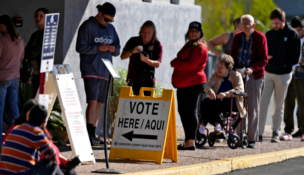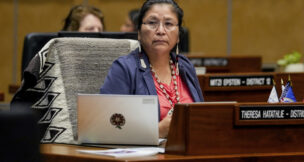Hamadeh calls for ‘brave attorneys’ to run against Judge Jantzen in 2026 election
Howard Fischer, Capitol Media Services//October 7, 2025//
Hamadeh calls for ‘brave attorneys’ to run against Judge Jantzen in 2026 election
Howard Fischer, Capitol Media Services//October 7, 2025//
Key Points:
-
Abe Hamadeh seeks to oust trial judge Lee Jantzen
-
Hamadeh claims Jantzen unfairly ruled against him in 2022
-
State courts have repeatedly rejected Hamadeh’s legal challenges
Three years after he was defeated in his 2022 bid for attorney general, and after losing a series of lawsuits trying to claim the office, Abe Hamadeh is now trying to oust the trial judge who refused to declare him the winner.
In a social media post, his campaign account is seeking out “brave attorneys who live in Mohave County” to run against incumbent Lee Jantzen.
” ‘Judge’ Jantzen, who inexplicably ruled against Abe Hamadeh’s election lawsuit WITHOUT considering the evidence is up for election again in 2026,” the post on X reads. It claims that Jantzen “helped disenfranchise THOUSANDS of voters.”
Hamadah and anyone else can make this kind of plea because, unlike the urban counties, superior court judges in rural counties are directly elected, just like any other politician. And that provides the opportunity for any lawyer — a requirement to sit on the bench — to campaign for the office.
“We have to uproot the corruption in Arizona,” the post reads.
“We can start with this judge,” it continues, with a photo of Jantzen.
And any doubt that Hamadeh disagrees with his campaign was dispelled when he reposted the screed himself.
Jantzen, a Republican like Hamadeh, could not be reached for comment. And Hamadeh, who won his 2024 bid for Congress, did not respond to multiple messages seeking an explanation of his claim that he did not get a fair shake in Jantzen’s court.
The actual records of the case, however, paint a quite different picture.
It begins with the fact that Hamadeh chose to challenge his loss to Democrat Kris Mayes in Mohave County Superior Court. All the judges on the court are Republican, meaning that whoever was assigned the case would likely be from the same party as Hamadeh.
That, however, didn’t help when the case landed in Jantzen’s court.
“The bottom line is, you just haven’t proven your case,” the judge told Hamadeh’s attorney, Tim LaSota.
Jantzen said any mistakes that may have been made in how ballots were counted “were not enough to overcome the presumption the court has to have in election cases … that the election was done correctly.”
“There isn’t enough information — I don’t think even slight information — the election was done illegally or incorrectly,” Jantzen said in a ruling from the bench after the half-day trial in December 2022.
The judge acknowledged that out of 2,300 ballots reviewed, 14 ballots were presented where there could be some question of whether a vote should have been counted, either for Hamadeh or Mayes. These were ballots where the marks made by voters were less than clear. However, Jantzen said that wasn’t enough for him to rule that county officials, who had checked these ballots by hand, had done something wrong.
La Sota argued that the results might have been different had the judge allowed him to examine more ballots from Maricopa, Pima and Navajo counties. But Jantzen said that request went beyond the scope of what’s allowed in election contests — contests that have to be resolved quickly.
It was after that ruling that Hamadeh first raised the claim that there were “thousands of uncounted provisional ballots.”
These are ballots that are accepted but set aside for various reasons, including a voter’s failure to produce required identification at the polling place, the absence of the person’s name on the voter registration rolls, or an indication that the person has already voted.
That last situation became an issue in the 2022 race after some Maricopa County voters, who found long lines at some locations due to printer and tabulation issues, chose to leave and go to a nearby site. But unless they formally “checked out” of the first polling place, the records listed them as having voted.
La Sota acknowledged, however, that county officials said they did go back through provisional ballots in the last category and count them after determining there were no other votes cast by that person that day.
Hamadeh went back to court claiming to have “newly discovered evidence.” But Jantzen refused to give him a new trial to present all that.
That was affirmed by the state Court of Appeals. Appellate Judge David Gass, writing for the majority in the 2-1 decision, stated that Hamadeh never adequately explained how any of this would have affected the final outcome, which showed he lost to Mayes by 280 votes.
The appellate court also said that Jantzen did not err in rejecting various requests by Hamadeh for information from Maricopa County, including a list of people who cast provisional ballots but whose votes were not counted. Here, too, Gass said Hamadeh failed either to act promptly or to show that any of this was relevant.
And the court rebuffed claims that Jantzen had acted improperly in limiting the time he had to prepare his legal arguments for his trial.
Hamadeh clearly was displeased with the ruling, calling it “a display of a neutered justice system that not only defies common sense, but defies the rule of law.”
“The ruling illustrates that one of the most disgraceful elections in the history of our state will never face accountability or honor the true will of the people,” he said in his prepared statement.
None of that ended Hamadeh’s efforts to be declared the winner.
He pursued a separate claim that his constitutional rights were violated in the 2022 race.
Hamadeh pointed out problems with printers at Maricopa County voting centers that resulted in long lines — lines, the Republican contender said, that led some voters to simply walk away.
More to the point, Hamadeh and his legal allies at AZ Voters Rights said these dissuaded voters were more likely to have been Republicans. And that, he said, could have changed the results of the race he officially lost to Mayes by 280 votes.
All that, Hamadeh charged, violated his rights of equal protection and due process. And that, said attorney Ryan Heath, provides legal grounds to set aside the certified results and order Maricopa County to conduct a redo of the election.
But Maricopa County Superior Court Judge Scott Blaney said that all is legally irrelevant.
“This case is actually an untimely election contest,” the judge said, no matter how it’s dressed up as a violation of constitutional rights.
“Any action contesting a state election must be filed within five days after completion of the canvass of the election and declaration of the result thereof by the secretary of state or the governor,” said Blaney. That would have been in the first week of December 2022; the case was filed in November 2023.
Hamadeh fared no better in another lawsuit where he charged that Mayes was holding office illegally.
He argued only those ballots where the signatures matched the original voter registration record should have been counted. By contrast, the county validated ballots where signatures matched other records, including ballot affidavits from prior elections.
However, Maricopa County Superior Court Judge Susan Pineda pointed out that the county had announced months before the election how it would verify ballot signatures. The judge said that if Hamadeh had a problem with the procedure, he should have brought it up then.
“By filing his action after completion of the election, petitioner asks the court to overturn the will of the people, as expressed in the 2022 election,” Pinea wrote.
The judge also took issue with Hamadeh for using a process known as “quo warranto, an action seeking a declaration that someone is holding office illegally.
That is a legitimate procedure. But the judge noted that, generally speaking, it can be brought only by a person claiming to be the rightful officeholder, something she said requires proof that the person “is entitled to the office.”
But in this case, Pineda said, what Hamadeh was seeking was reverification of the 2022 Maricopa County mail-in ballots after “purging” those allegedly improper signature comparisons or, in the alternative, a new election. The judge wasn’t buying it.
“He surmises, without proof, that he received the most ‘legal votes’ for the office of attorney general,” Pineda wrote. “That is insufficient to obtain the relief sought.”














































